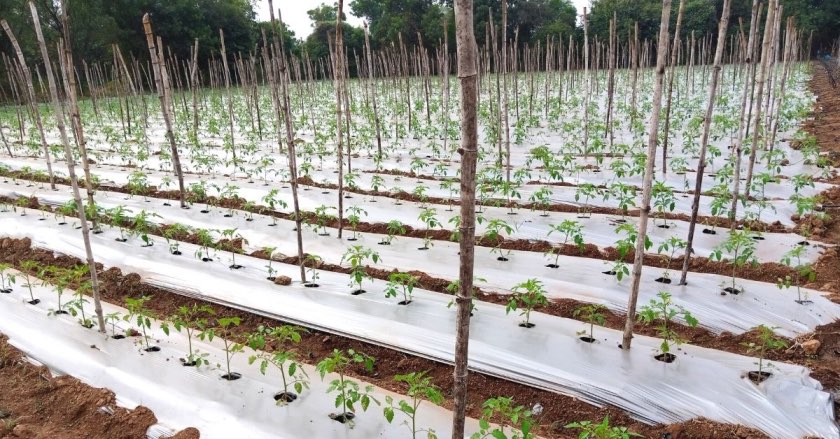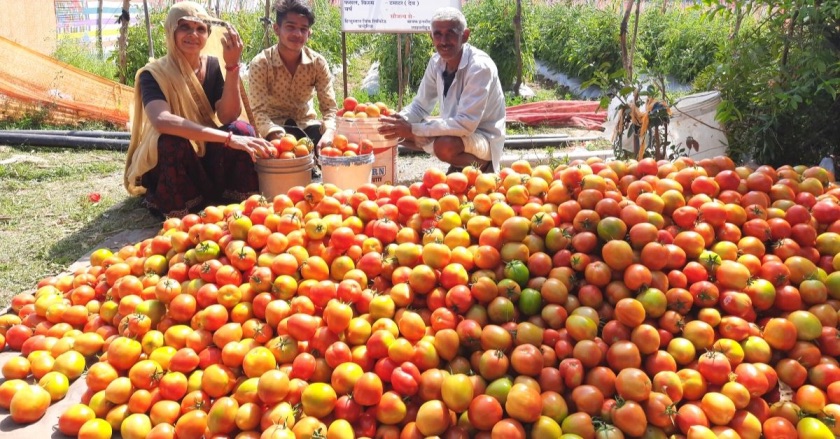Shankar Jaat from Salera village Rajasthan is a traditional farmer, growing tomato, beans and wheat on his 1.25-acre land. However, the 45-year-old marginal farmer never earned more than Rs 60,000 a year, because unlike other fertile regions of India, the state’s harsh weather and arid climate conditions do not allow farmers to get surplus harvest. Shortage of water often limits farmers to only one crop rotation per year. They often rely upon the mercy of the monsoon for a good harvest.
However, over the years, Shankar has adopted scientific techniques that have now aided him in earning Rs 4 lakh a year, with the same crops on the same amount of land.
“I started growing tomatoes on the farm in 2016. But the yield was low. I did manage two crop rotations, but could barely cover the expenses of a family of six,” Shankar tells The Better India.
He says that after training and learning scientific techniques under the Bharatiya Agro Industries Foundation (BAIF) Research Foundation, his income has steadily improved.
A 70% reduction in water requirements

“Experts in the field helped me procure the ‘1057 variety’ of tomato from Dev Company on one beegha (0.6 acres) of land using techniques of mulching and drip irrigation. I learned organic methods of growing the fruit by making jeevamrut, a combination of cow dung, cow urine, water, gram flour and jaggery,” he says.
Shankar also started systematic plantation of crops for efficient utilisation of space. Additionally, implementing mulching on the land helped him reduce the rate of evaporation. “The use of these two techniques alone saved water requirements by 70 per cent,” he says.
Instead of the earlier practice of watering the farm for an entire day once in three days, Shankar started watering the plants every day for 20 minutes. He immediately reaped the results of a good harvest. “The same method was replicated on an additional 0.6-acre land. The collective harvest helped me achieve bumper produce and earn lakhs of rupees,” he adds. Shankar says he continues to grow wheat on the remaining land, which earns him additional income.
“I struggled with spreading mulching. BAIF helped me with expenses on the initial 0.6-acre land, but arranging the loan for investing in expansion of cultivation was a challenge. I borrowed money from relatives,” he adds.
An outcome that inspires others

Nagin Patel, associate programme manager at the foundation, says, “A demonstration is provided to farmers on their land to show them a methodical approach to adopt in farming. The farmer saves electricity and expenditure on pesticides and insecticides, which in turn reduces the production cost.”
Nagin says the exercise helps farmers build confidence in shifting from traditional farming methods to adopting a systematic approach. “Keeping distance between the plants, reducing excess irrigation, and regular maintenance of plants helps improve the harvest,” he says, adding that the overall outcome betters the lives of the farmer and his family, while motivating others to follow the same process.
Shankar has become an inspiration for his success, and around 50 people from neighbouring villages have visited his farm. “Farmers approach me to seek guidance about the methods I have used. Three from my village have decided to adopt this scientific and organic approach,” he says.
The farmer says the additional income has helped him provide better education to his children and lead a better life. “I have never earned so much money from agriculture in my life. I am glad I took the risk,” he adds.
Edited by Divya Sethu
No comments:
Post a Comment